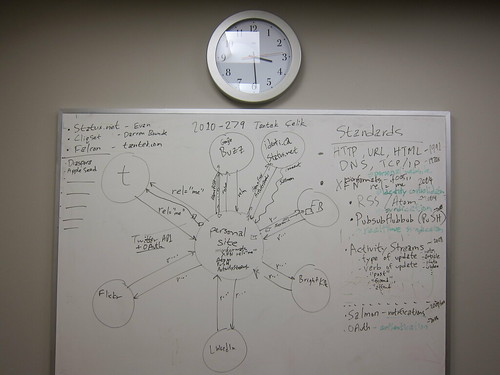Jeffrey Zeldman recently posted a partial summary of a conversation we had yesterday:
- ttk.me links are permashortlinks to originals. Twitter is a copy.
- I find value searching/finding past "tweets" which I get with self-hosting but not Twitter.
- @Falcon (runs tantek.com) needs reply buttons. And fave, RT, etc. They're coming.
This blog post is a reply to Jeffrey's post, because, ironically, the solution he's using, WordPress, refused to accept it as a comment:
Hmmm, your comment seems a bit spammy. We're not real big on spam around here.
Please go back and try again.
WordPress doesn't know the difference between spam and well hyperlinked discourse among old friends and colleagues.
So go read his post / comments first if you came here first.
Jeffrey's right that I'm doing it the (currently) harder way, because this technology (owning your data - across multiple data types) just hasn't been built yet (why I'm building it). And no blogs are not it - blogs are merely one data type (long form structured essays typically with titles, sometimes with other media included.) Nevermind that they're all dependent on fragile databases which are unreasonable for individuals/independents to have to maintain themselves.
I totally agree that kludged mirrors of your own tweets aren't the solution
.
Simply copying from these shared social services still leaves you vulnerable to their flakiness, poor auto-shortening of links, unscalability, downtime, maintenance, database failures, and acquisitions.
That's why I don't post to other services and copy to my site.
That's not what I'm doing.
Starting in 2010 I began using tantek.com to post my short notes (AKA tweets) and copying (AKA syndicating) them to Twitter.
Since then I also added articles (AKA full blog posts) and have additional content types (comments, geolocation check-ins, status updates, photos) in the development pipe.
I'm not copying from Twitter. I'm syndicating and copying to Twitter. As I said, Twitter is the copy.
There's a big difference. When Twitter goes down, I can keep posting, and my updates still go to the other destinations that take/share updates, e.g. Google Buzz, Identi.ca, Friendfeed, and whatever other service(s) might come along to replace them all. I'm not beholden to Twitter's stability/downtime - the copies there will appear when Twitter returns from such outages.
If your data is vulnerable to some social sharing services' whims or flakiness - you don't own your data - they do (their terms of service even says - they can do as they please with your content, with Flickr as perhaps the only exception).
You may not think tweets are worth preserving, but the Library of Congress (LoC) certainly does.
Historians / digital librarians are quick to point out the relevance of events/content is rarely grasped in their moment of occurrence/creation but rather, only really understood much later with a longer term perspective. You don't know the value of your own tweets.
I think they are worth preserving, and worth finding, and I'm not willing to wait for either Twitter or the LoC to do it because I think I can do better, and I'm starting with my own.
I'm building a solution, bit by bit. It's certainly incomplete, and with rough edges (Jeffrey has pointed out plenty of the areas that need work), but iteratively improving as I find time and inspiration to work on it.
I'd rather host my data and live with such awkwardness in the open than be a sharecropper on so many beautiful social content farms.
This is what I mean by "own your data". Your site should be the source and hub for everything you post online. This doesn't exist yet, it's a forward looking vision, and I and others are hard at work building it. It's the future of the indie web.
Are you a builder (designer, ux, developer) and brave enough to publicly collaborate in creating this future including on your own site? Join us at IndieWebCamp this June in Portland.

